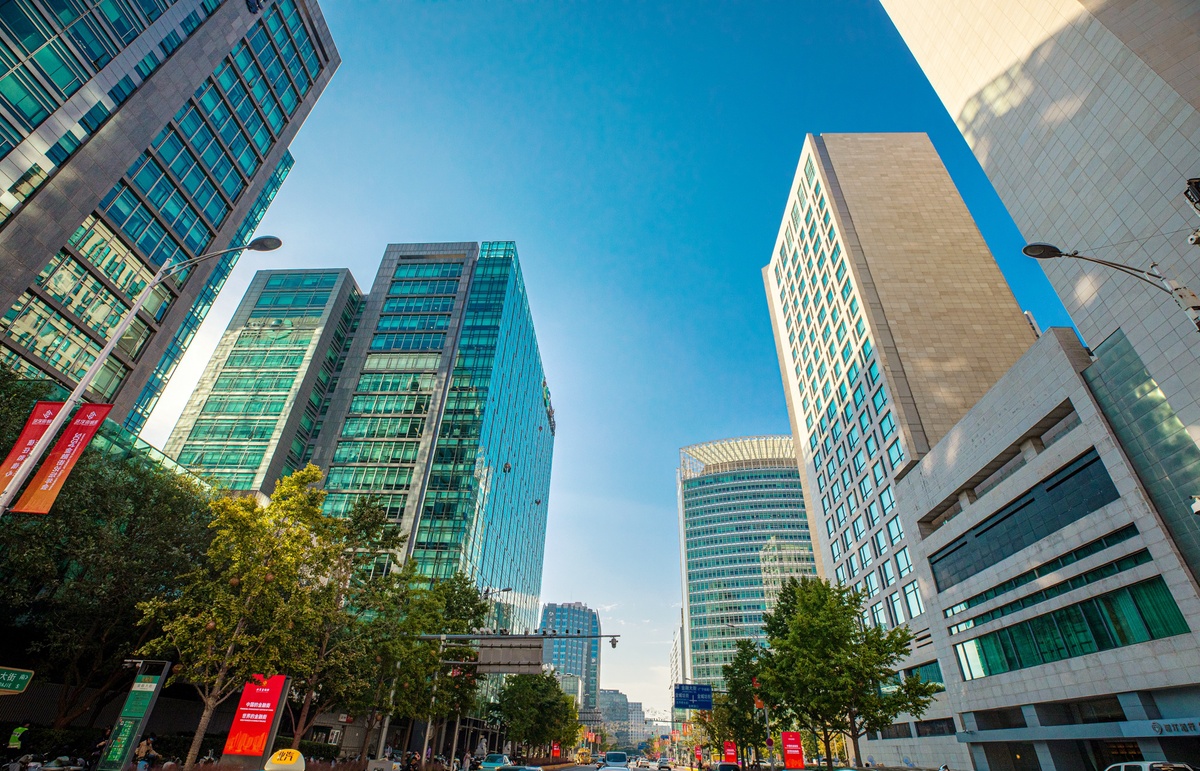
Financial Street is a bustling economic hub in downtown Beijing, where more than 1,900 financial institutions from China and abroad have made a presence. WEN ZHAO/FOR CHINA DAILY
As the Annual Conference of Financial Street Forum opens in Beijing on Friday, the place where the forum happens and takes its name from is stepping into the spotlight.
Located in Xicheng district of Beijing, Financial Street is now home to more than 1,900 financial institutions. Their combined assets exceed 150 trillion yuan ($21.09 trillion), accounting for one-third of the country's total.
After more than 30 years of development, the street has become a leading economic hub in the city center and become a globally renowned financial district.
"Financial Street in Beijing, occupying only two 10,000ths of the city's total area, contributes nearly 40 percent of the added value of the city's financial industry and close to 70 percent of tax revenue of the financial industry, making it a leading financial hub in Beijing," Liu Dongwei, head of Xicheng district, said at a recent news conference.
In the 2.59-square-kilometer core area of Financial Street stand more than 60 commercial buildings.
Among them, the Winland International Financial Center has attracted more than 40 global financial institutions including Goldman Sachs, J.P. Morgan and UBS.
"Since 2002, we have been communicating with international financial institution clients," Yu Zhiqiang, chairman of Winland Group, told Xinhua News Agency.
"Over the past 20 years, the needs of our clients have continuously evolved and our service standards have kept pace, forming an operational service and security system that is in line with the standards of top international financial institutions," Yu said, adding: "We have received positive feedback from our clients."
Mi Yang, head of research for JLL North China, told Xinhua that in the fourth quarter of 2023, rental prices for pure leasing projects in Financial Street saw a slight decrease but still remained at the top nationwide. It had the lowest vacancy rate for commercial buildings in Beijing. In his opinion, the street has embarked on a path of high-quality development.
There are nearly 210,000 financial industry professionals working on Beijing Financial Street, two-thirds of whom have a master's degree or above.
"For young people, Financial Street is a comprehensive platform for growth," said Feng Kai from the Export-Import Bank of China, who has been working on Financial Street for more than 10 years. "Here, you can keep abreast of the latest financial trends and the highest-level financial expertise, and access the most professional financial talent.
"In the process of serving the real economy, preventing financial risks and deepening financial reform, you can realize your own value," said Feng.
Data from the Beijing Financial Street Services Bureau show that the talent, information and service aggregation effects in the Financial Street business district are increasingly evident.
In 2023, 50 new financial institutions were introduced to the street, with an additional registered capital of 41.3 billion yuan. Currently, Financial Street has gathered more than 800 key financial institutions and 175 headquarters enterprises. Of them, 16 have joined the ranks of the Fortune Global 500 companies.
A sound business environment has proved to the biggest magnet for these financial institutions. For more than 30 years, Financial Street has adhered to the service concept of combining government, chambers of commerce and enterprises, catering to the needs for the development of the financial industry, financial institutions and financial professionals, and continuously improving services.
Facing the complexity of the global economic situation, Beijing Financial Street is promoting the inflow of financial institutions, professionals and information; improving the quality of modern financial services; strengthening its role as a national financial management center and contributing to the construction of a financially strong country, local officials said.
Driven by the street, Xicheng district has posted strong performance in its financial industry.
The district's financial industry achieved an added value of 322.75 billion yuan in 2023, a year-on-year increase of 6.8 percent. That has been higher than the average growth of the city's financial industry for three consecutive years and accounted for 37.3 percent of the total added value of the financial industry in the city, according to Lu Wuxing, head of the Beijing Financial Street Services Bureau.
The momentum continued into the first half of this year, when the added value of the financial industry in Xicheng amounted to 158.4 billion yuan, up 6 percent from the same period of 2023. That accounted for 54.4 percent of the district's GDP, setting a record.
Nineteen financial institutions were introduced to the street this year, adding registered capital worth 75.4 billion yuan.